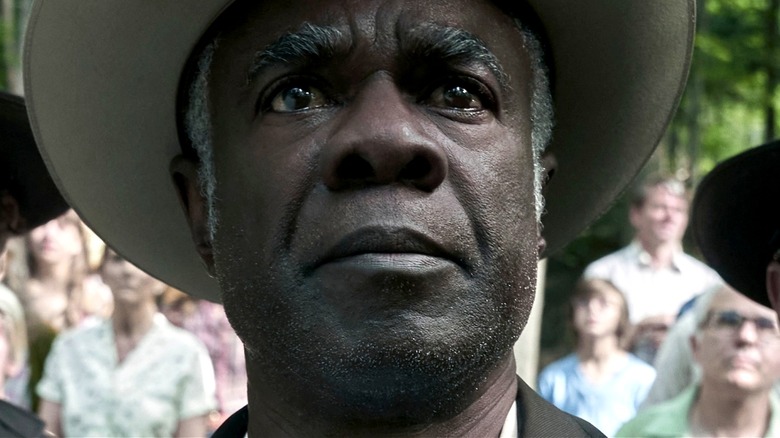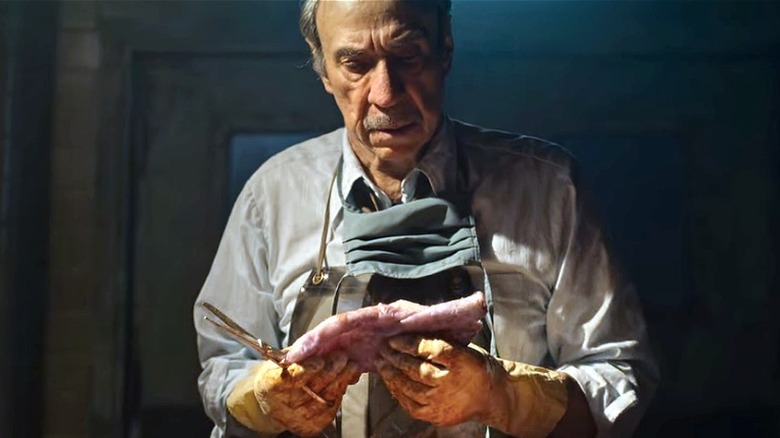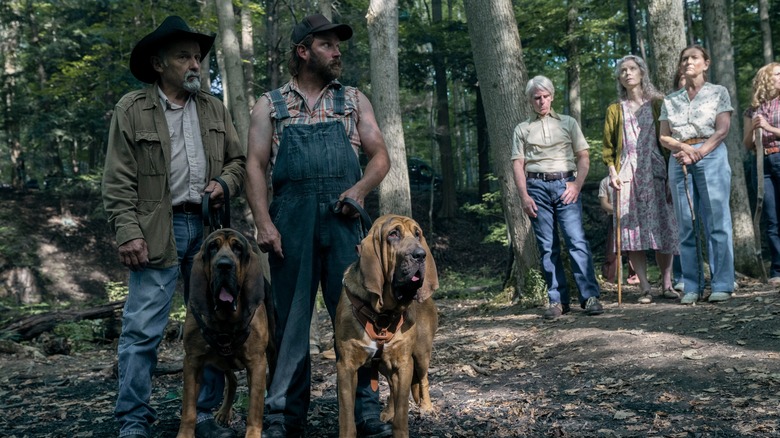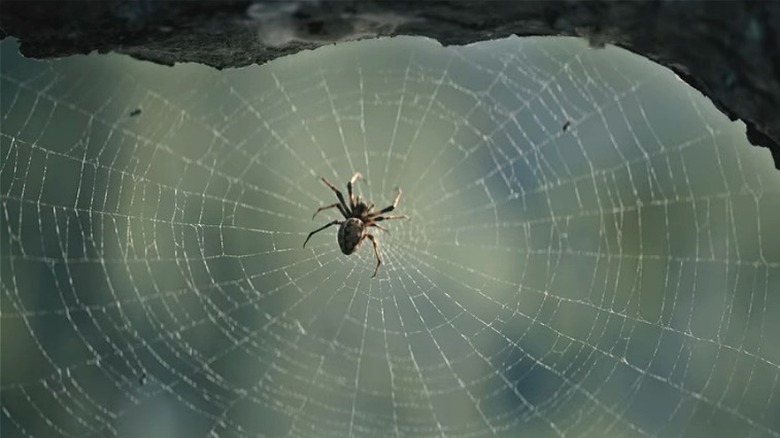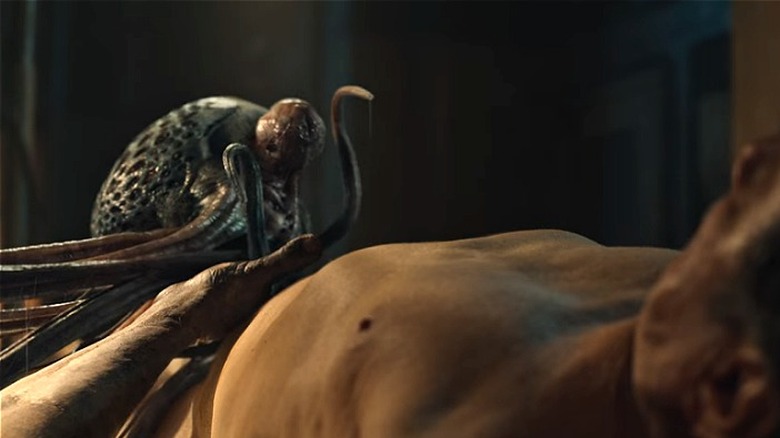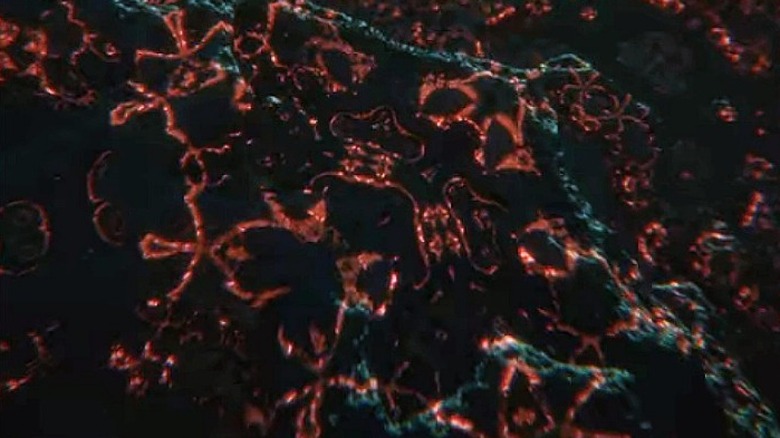The Autopsy Episode Of Guillermo Del Toro's Cabinet Of Curiosities Is Gripping Viewers
It's been less than a year since David Prior had audiences falling in love with film again thanks to "Voir," a collection of visual (and visually stunning) essays he co-created alongside executive producer David Fincher (lately, of the beloved "Love, Death & Robots"). Now, having lent his skills as a director of another anthology on "Guillermo del Toro's Cabinet of Curiosities," the producer and director, who's known mostly for his work on documentaries about film (via IMDb), has viewers in his grasp once more. This time, Prior was tasked with bringing del Toro's "The Autopsy" to life.
Part alien invasion story, part something else entirely, the 58-minute episode balances complex questions, commentary, and themes (all delivered with del Toro's distinctly light touch) with heightened narrative tension, gruesome and provocative visuals, and an ending with multiple layers of twist.
Reviews have varied with regard to their focus — with some keying in on the enthusiastic use of body horror, others lauding Prior's talent for atmosphere, and the likes of Roger Ebert's Nick Allen referring to the short as "delightfully unhinged." However, both critics and audiences (via Reddit) seem to agree on one thing: "The Autopsy" is the anthology's blood-curdling crown jewel, thanks, in no small part, to its unexpected ending.
The Autopsy explores a decades old debate
Guillermo Del Toro introduces "The Autopsy" as a story that answers the relatively straightforward question about whether or not we're alone in the universe (with, as he says, "a decidedly terrifying 'no'"). But the simplicity of his introduction is as much a sleight of hand as the episode's tense mystery, ominous atmosphere, and ghoulish and graphic imagery are. All this distracts us into thinking we're watching a basic, plot-driven narrative. The reality is that all alien invasion stories, by definition and before they've even begun, have already answered that question, and it's not their primary investigation. It's the implications of that premise — and what the reality of aliens means with regard to humanity's continually evolving (and often zealously held on to) beliefs about who we are and where we came from — that the existence of aliens calls into question.
"The Autopsy," unlike so many alien-based inquiries into this theme, focuses its argument on a more specific debate — one that first gained momentum in the mid-19th century when Charles Darwin published "On the Origin of Species." While the episode is far from the first alien invasion tale to tackle the origins of humanity, its continual nods toward (and focus on) the evolution vs. creationism debate ground its gore and spectacle in something more overtly profound, and cement its much-earned ending as a twist from both a narrative and thematic standpoint.
Setting plays a subtle but key role
We know from Abel's (James Acton) employment record and the portrait of Jimmy Carter in Sheriff Nate Craven's (Glynn Turman) office that "The Autopsy" takes place in a blue-collar mining town in Pennsylvania in the 1970s. Given the episode's focus, the setting is of no small consequence. Despite the then-century-plus knowledge of Darwin's theory, the '70s were host to multiple court cases involving public school curriculum's use of evolution and creationism as well as the evolution-rejecting Young Earth Creationism movement. The decade also saw its most outspoken figure, Henry Morris, found The Institute for Creation Research (via BMC).
Although none of the characters in "The Autopsy" outwardly reject the science behind evolution, two conversations between MCU star F. Murray Abraham's Dr. Carl Winters, our Man of Science protagonist, and Sheriff Craven, his Man of Faith best friend, point to the episode's focus on origin. While Craven believes he's been personally cursed by God, Winters rejects the idea of God as an interventionist, pointing out the inflated sense of ego and the importance such a belief requires. Still, Winters' repeated apologies to the corpses he's cutting into reveal that — his biology-driven worldview and his view of life as a "conveyer belt" notwithstanding — he has a reverence for life and for humanity as sacred in their own way, despite (and, ultimately, because of) everything he knows about the body. It's a nuanced and layered view that the ending of "The Autopsy" explores with surprising warmth.
The Autopsy recalls Frost's spider
The episode's repeated spider imagery (and its finale's reminder that our brain wiring looks an awful lot like a web) point even more directly to its interest in how humanity came to be. In his 1922 poem "Design," Robert Frost famously used the intricacy of the spider's web to explore the idea of Intelligent Design (a common element of creationism). But Frost's poem is less interested in proving whether or not an intelligent creator put us here, and more interested in questioning that creator's motives.
In the poem, the speaker watches as a "dimpled spider, fat and white" (not unlike the one the episode presents early on) devours a moth resting on a flower. In his final couplet, he asks, "What but design of darkness to appall?— // If design govern in a thing so small." In other words, it's a dark designer indeed, aka a malevolent or chaotic god, who would dream up and then painstakingly engineer such a scene and all its moving parts — that is, if that designer exists in something so much less "significant" than a human.
That the alien tells Winters, "my true form is small...shape...hideous to you" — and that shape being both dimpled, in the most trypophobia-sparking sense, and spider-like with its numerous legs and round abdomen — is a direct reference to Frost's small spider, and to the poem's suspicion of the spider's creator. It's an allusion that foreshadows Winters' ultimate revelation and ensures it's as much a twist as the doctor's self-sacrifice, and his revealing that the tape recorder was left on.
Winters' sacrifice is as symbolic as it is courageous
In one of the most telling exchanges of the episode, the alien (after explaining that it uses its host for most of its motor skills and all its senses) says, "The most supreme adaptations are purchased at the cost of inessentials ... we've no use for any of it, for we have transcended." At which point, Winters laughs. As he sees it, the alien is jealous of its hosts, but that's not the only reason for his laughter. Nor, for that matter, is the fact that he knows that the tape recorder is still on.
He's laughing, at least in part, because he knows that for all its streamlined use of evolution, the alien is an inferior species in every sense of the word. It can live, of course — and from a scientific standpoint, ensuring and allowing us to "live" is the ultimate goal of both evolution and our biology — but that's all it can do. It's important that, before he's taken over entirely by the survival-driven parasite, it occurs to Winters that his goal at that moment is (as he literally says) "not to live," but to save the lives of others and that of his friend.
In the end, "The Autopsy" reveals itself to be not just an alien invasion story that explores our insignificance, not just an answer to whether or not a benevolent, malevolent, or non-existent god created and designed humanity, but a reminder; one whose twist has as much to do with its success as any of its provocative visuals.
The Autopsy's true twist is its thesis
There are aspects of humanity — our love for one another, or our willingness to reject our animal instinct to live so that someone else might — that we'd be unable to explain even if we had all the answers. When the alien says, "we must not be understood," it's a front: the desperate wizard telling us not to look behind the curtain. And when Winters subsequently outsmarts the alien, the latter's ominous posturing — and, by extension, our own preoccupation with needing answers — suddenly look silly.
And so, Winters laughs. He may be a man of science, and he may see life, from a physiological standpoint, as wholly unromantic, but in the end, it's a combination of his knowledge of science and his love for his friend that "saves" him. As we travel through Winters' neurons and synapses, it's impossible not to see the distinctly human shapes in the intricate imprints and designs. Yes, they resemble the (potentially) malevolently-designed spider web, but they also resemble cave paintings: those first recordings humanity made as we evolved to question and reflect through art. We may not be the evolution superstars that the alien is, but we possess the ability to live on long after our deaths.
Thus, Winters was right all along: We are, as he says, "all heading for the same destination" — not heaven or hell or dust but memory. And Winters' remembering that the recorder (a tech-based form of memory) will tell his story is a brilliant means of reiterating the ultimate thesis of "The Autopsy."
